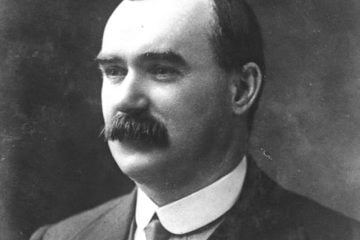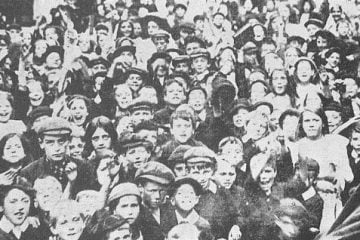Socialists are often told that only capitalist competition can develop enterprise and production, embolden initiatives and harness our collective energies for the good of all. Competition is the lifeblood of capitalism, we are told, one which can only thrive under the ‘free’ market.
This argument conveniently ignores the transformation of capitalist competition into monopoly domination, a feature that is characteristic of modern-day capitalism. Take it from the horse’s mouth: The Economist recently published an article titled “Without competition, capitalism favours the few and not the many”. The Economist in mourning the loss of competition is over a century late in realising this fact but in anycase there is no turning back the clock over this.
We would have to hark back to the days of small and scattered manufacturers – out of touch with one another, producing for an unknown market – to find any possible merit in this championed idea of ‘free’ competition. Monopoly is not simply an ambition of big business but flows from the logic of capitalism itself.
Lenin’s pamphlet “Imperialism: The Highest Stage of Capitalism” brilliantly analyses this transition and the resultant domination of the globe by a handful of powers. Utilising a wealth of facts and figures, Lenin shows how this trend was already well advanced by the early twentieth century.
Lenin wrote that competition has been replaced by “financial fraud, nepotism, and servility on the upper rungs of the social ladder”. This rings even truer today – we need only look at Trump’s ‘empire’.
Owing to the crisis-ridden nature of capitalism, cartels have become of ever-increasing importance in maintaining prices at a high level, disposing of rivals and ultimately restricting competition. Global trade is increasingly dominated by circuitous routes linked to transnational corporations. 80% of world trade takes place in such ‘value chains’, according to a 2013 UN conference report.
Since Lenin’s day, the centralisation of capital into fewer and fewer hands has proceeded apace. In 2011, a study at the Swiss Federal Institute of Technology found that just 147 companies – mostly banks and finance houses – controlled 40% of all wealth in the world. A total of 737 companies accounted for 80% of the world market.
No wonder, whilst deriding the idea of a socialist planned economy – planned by the majority in the interests of the majority – we find apologists of capital instead defending their anarchic system, planned by and for a tiny minority.
Lenin’s analysis looks at such issues as the predominance of monopolies and finance capital; the importance of exporting capital (as opposed to commodities); the overwhelming dominance of the big banks and their fusion with the state; the division of the world into ‘spheres of influence’; and an explanation of imperialist war.
The truth is that Lenin’s assessment has not only stood the test of time but has become ever more relevant in understanding our epoch. The question of the re-division of the world between and after the two World Wars could only be settled by violent conflict. The recent military adventures, which have further destabilised the social, political and economic planes in the Middle East, can also most aptly be understood and explained through the Marxist theory of imperialism.
As Marxists, we understand imperialism as flowing directly from the monopoly stage of capitalism. Though imperialism, understood in its narrower sense as the conquest and plunder of foreign lands, has existed for many centuries, this now represents capitalism in its most developed stage.
Unlike pre-capitalist forms, the predatory domination of imperialism exercises its control through the mechanisms of world trade, alongside the violent re-division of the world market and its ‘spheres of influence’.
It has been suggested that the imperialism of old has been superseded by a smoothly operating, globalised world working towards peace and prosperity – the so-called international community. This could not be further from the truth; poorer countries are, in fact, profiting the elites of the richer ones at great cost. The stranglehold of imperialism over former colonial countries is even greater than it was in the past.
The US-based Global Financial Integrity (GFI) and the Centre for Applied Research at the Norwegian School of Economics undertook a comprehensive assessment of resource transfers between poor and rich countries. In 2012, poorer countries had a net annual outflow of $2 trillion to richer countries. Since 1980, the net outflow from poorer countries to richer countries has amounted to $16.3tn. As Dr. Jason Hickel, an economic anthropologist, writes:
“The aid narrative begins to seem a bit naïve when we take these reverse flows into account… It makes the takers seem like givers, granting them a kind of moral high ground while preventing those of us who care about global poverty from understanding how the system really works.”
Liberals often speak of offering a ‘helping hand’ to the so-called developing world. But the language of aid, peace and prosperity should be treated with a healthy dose of scepticism. In reality, the opposite is the case. The promised aid and investment just results in renewed exploitation and impoverishment through privatisation, trade deals, corruption and ever mounting debt, all courtesy of the imperialists. They steal from the poor to give to the rich – this is the defining feature of capitalism.
We do not have to look far to find a blatant example of this Robin Hoodism in reverse even at home. The masses ultimately always foot the bill for the billions lost by the banks, which have acquired a new role under imperialism. The NEF, an independent economic think-tank, has shown that British banks received £1.2tn in support during the financial crisis of 2008. We can pose the question simply: if the banks were only able to survive by leaning on the crutches of the state, what is left of the ‘free’ market economy?
The world’s largest banks have a huge commercial advantage through state subsidies. Not only this, but the implicit guarantee that the state will not allow them to go bust encourages dodgy speculation. These vices are clearly engendered within the system itself. With the state providing a safety net and covering loses, there is nothing left of the argument that the bankers and capitalists deserve to be rewarded for their non-existent risk taking.
The NEF report states that all this has helped facilitate excessive pay and non-productive lending. This is exposed by the fact that only 10% of all bank lending in the UK supports businesses outside the financial sector. This movement towards potentially high but non-productive returns means that industry is hindered through lack of financial support, often just when it needs it most. So much for enterprise and initiative!
The glorified claims of capitalism are easily disposed of. It is plain as day that competition is stifled by monopoly; the so-called competitive edge that capitalism has over socialism is a fiction. In fact, capitalism hates competition. The alternative? Lenin wrote elsewhere about socialism, capitalism and competition in the following way:
“Far from extinguishing competition, socialism for the first time creates the opportunity for employing it on a real wide and on a really mass scale, for actually drawing the majority of working people into a field of labour in which they can display their abilities, develop their capacities, and reveal those talents, so abundant among the people whom capitalism crushed, suppressed and strangled in thousands and millions.”
It is crucial that we have a scientific and rigorous understanding of the underpinnings of imperialism in order to offer an honest solution to the youth and workers of the world. That is why I recommend reading Lenin’s Imperialism.
Khaled Malachi, Cambridge Marxist Society




1 Comment
Kevin McCabe · September 7, 2019 at 6:58 pm
I read Lenin’s Imperialism when I was only 17. We know that capitalism wasn’t so advanced when he wrote it. Even Russia was such a non-industrialised country. However, Lenin made an accurate analysis on where capitalism was heading to and this is even more relatable today. Raise of Fascism, wars, terrorism and far right extremism are good examples.